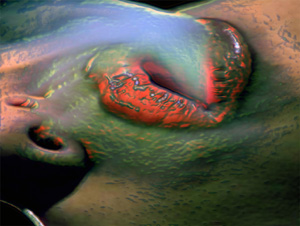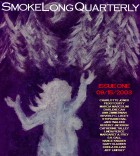When did you first know you wanted to be a writer?
I’ve always needed to write. As a child I did practically nothing but read books, so manipulating language seems to come fairly naturally to me. I’ve only really identified myself as a “writer” for the past couple of years. It’s not something I ever aspired to be. I feel like I’ve always already been a writer, but for most of my life I was studying to become something else.
What authors inspire you? Any favorite books?
My literary heroes are Ronald Firbank and James Purdy, because they are inimitable. Nobody writes like they do. Any of their works rank among my favorites. Another favorite is B.E. Ellis’ American Psycho, because it’s so incredibly sharp and funny, and as this kind of infinitely meticulous commentary on male narcissism I just think it’s outstanding. Dennis Cooper, for the way he expresses ugliness and pain. Alan Hollinghurst. Christopher Coe. Paul Bowles. Proust. Kenzaburo Oe. Eudora Welty. Dostoevsky. These are a few writers who have changed my thinking about writing.
What is it about Pittsburgh writers and gay themes? First, Chabon. Now you. Dish.
Well…from Michael Chabon to me is a huge leap with not a lot in between! I was reading Mysteries of Pittsburgh around the time that I was applying for colleges, and that book strongly influenced my decision to attend the University of Pittsburgh. It wasn’t so much how Chabon described the city, or even that he graduated from the University of Pittsburgh, but that he wrote about sexual ambivalence with a particular kind of wry, honest poignancy. This made a big impression on me, because I was very naive and isolated and thought gay literature was typified by Naked Lunch. The irony, of course, is that Chabon is married and has a family now.
Pittsburgh is not a very “gay-themed” kind of city. It’s culturally conservative, borderline-Midwestern, domesticated. But the fact that there’s this kind of covert quality to Pittsburgh’s gay life, that for instance, a lot of gay men here are married, doesn’t bother me at all. As much as I’m in favor of a vibrant, vocal gay community, abstractions like “visibility” and “pride” aren’t necessarily that compelling.
So…tell us how you really feel about elderly people.
I’m very interested in how, on a cultural level, we can’t seem to reconcile aging and sexuality without either glorifying it, denying it, or denouncing it. I think we’re both disgusted and enthralled by the idea of old people having sexual identities and leading sexual lives. I view this mainly from the perspective of intergenerational relationships.
As far as how I feel about “elderly people” as a segment of society, I don’t suppose my ambivalence is much different from most people’s.
Anything else you’d like to say? Hi, mom? Eat at Joe’s?
Age is just a number.



 The core workshop of SmokeLong Fitness is all in writing, so you can take part from anywhere at anytime. We are excited about creating a supportive, consistent and structured environment for flash writers to work on their craft in a community. We are thrilled and proud to say that our workshop participants have won, placed, or been listed in every major flash competition. Community works.
The core workshop of SmokeLong Fitness is all in writing, so you can take part from anywhere at anytime. We are excited about creating a supportive, consistent and structured environment for flash writers to work on their craft in a community. We are thrilled and proud to say that our workshop participants have won, placed, or been listed in every major flash competition. Community works.